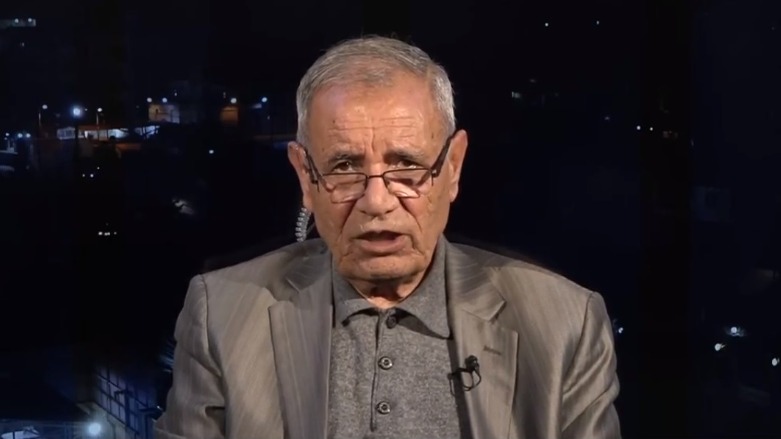Syrian Kurdish political leader hopeful for third found of party talks

ERBIL (Kurdistan 24) — Salih Gheddo, the leader of the Kurdish Democratic Left Party, told Kurdistan 24 that he is hopeful that the planned third phase of the intra-Kurdish dialogue in Syria will succeed.
“Positive steps have been taken during the intra-Kurdish dialogue, like the agreements on the joint political opinion and the establishment of the Kurdish reference [Supreme Body],” Gheddo told Kurdistan 24 in an interview on Saturday.
“The Kurds in Rojava are in the middle of a sensitive era, and what can preserve Kurdish interests at this stage is Kurdish unity.”
The two major factions among Syrian Kurdish political parties renewed negotiations in early November in an effort to stand together as a united front after Turkey’s cross-border offensive in northern Syria in October 2019.
The Kurdish National Council (KNC) previously held seven months of talks with its rival Democratic Union Party (PYD) – an affiliate of the PYNK (Kurdish National Unity Parties) and the leading component of the political wing of the Syrian Democratic Forces (SDF), the Syrian Democratic Council (SDC).
The talks were suspended due to the absence of US officials and American elections in November but are expected to resume this month.
So far, US officials have met the two sides separately.
Read More: SDF chief signals resumption of intra-Kurdish dialogue
“We are optimistic that the third phase of the intra-Kurdish dialogue will be successfully concluded. Both sides must avoid creating obstacles. The KNC and PYNK have a higher responsibility in this regard,” Gheddo added, using the Kurdish acronym for the KNC.
“To begin the upcoming phase of the talks, media statements [by political parties] against each other must stop. We respect the Roj Peshmerga, and they are the sons of Rojava, we can solve this matter with a sense of responsibility and through dialogue,” he added.
The Rojava Peshmerga are the official military wing of the KNC and their future inclusion in northeast Syria is a point of contention between the parties.
Tensions increased last month in the absence of US negotiators after party officials made statements to the media on the return of the Rojava Peshmerga, who are trained by Peshmerga forces from the Kurdistan Region.
The 5,000 Rojava Peshmerga fighters played a role in the fight against ISIS near Mosul, but were not able to return to Syria due to disagreements with the People’s Protection Units (YPG), which is close to the PYD.
In a statement to Kurdish media, PYD official Aldar Khalil claimed the Rojava Peshmerga were “mercenaries working for Turkey,” and that any future role for them in the military in northeast Syria “is improbable.” The statements prompted an outcry from the KNC.
In the past, the SDF and YPG refused to consider the return of the Rojava Peshmerga to Syria, arguing that such a military division could lead to a Kurdish civil war, similar to the conflict between parties in the 1990s in the Kurdistan Region.
However, the KNC insists that the Rojava Peshmerga, as a native Syrian Kurdish force, has the right to return to Syrian Kurdistan.
Gheddo added that the PYNK are ready to start the negotiations, but are waiting for the KNC to announce their willingness so that both sides can sit together.
“The American side has been monitoring the negotiations, and now they are waiting for the participants to sit and make progress,” he said.
Over the weekend, SDF Commander-in-Chief Mazloum Abdi again highlighted the importance of Kurdish unity while speaking at a seminar held by the Rojava Center for Strategic Studies.
"Kurdish differences should not be an obstacle to achieving Kurdish unity, no matter how long the wars and differences appear,” he said in a video message to participants of the seminar in the northeastern Syrian city of Qamishlo (Qamishli).
YPG spokesperson Nouri Mahmoud told Kurdistan 24 on Saturday that the YPG will support any agreement reached.
“Indeed when there is a common view on principles, and when there is a social contract, then the defense forces will be acting accordingly," he said.
"And so we will act [with] the political parties. As the YPG, we will be ready and we will devote all our resources for such development backing the foundation of Kurdish unity towards [a recognized] status for the Kurds. We are ready to offer any sacrifice,” he concluded.
Other issues due to be discussed in future meetings between the parties include the political makeup and social contract of the Autonomous Administration of North and East Syria (AANES).
Additional reporting by Cemal Batun and Ekrem Salih
Editing by Joanne Stocker-Kelly